Jul 10
/
Matt Saunders
Easily Generate Leads with a Marketing Scorecard Quiz
Learn how I generated 260+ leads in six months with a simple marketing scorecard, and follow the 5 steps here to repeat my success.
Are you a service-based business owner who struggles to generate consistent leads?
If so, you're in a well established club, because this is probably the biggest challenge my coaching clients face in growing their business.
In this article I'm going to show you how I generate consistent leads as a business coach using a marketing scorecard quiz. This incredibly simple concept, when applied using the instructions I share here, will make sure your pipeline never runs dry. In fact, with the right setup, you'll be able to generate leads on autopilot (yes, really!)
Below you'll see a screen grab from one of my marketing quizzes. This is just a small sample of the leads I've collected. I've generated 260 leads in the past six months. That's 43 potential clients per month on average. About 30% have gone on to buy something from me.
I'll get into the nuts and bolts of this soon, but first let me ask: what would it mean to your business if you could comfortably generate multiple pre-qualified leads a week?
Imagine the potential for your growth, impact and income. This is MASSIVE. Let's dig in and I'll show you how.
If so, you're in a well established club, because this is probably the biggest challenge my coaching clients face in growing their business.
In this article I'm going to show you how I generate consistent leads as a business coach using a marketing scorecard quiz. This incredibly simple concept, when applied using the instructions I share here, will make sure your pipeline never runs dry. In fact, with the right setup, you'll be able to generate leads on autopilot (yes, really!)
Below you'll see a screen grab from one of my marketing quizzes. This is just a small sample of the leads I've collected. I've generated 260 leads in the past six months. That's 43 potential clients per month on average. About 30% have gone on to buy something from me.
I'll get into the nuts and bolts of this soon, but first let me ask: what would it mean to your business if you could comfortably generate multiple pre-qualified leads a week?
Imagine the potential for your growth, impact and income. This is MASSIVE. Let's dig in and I'll show you how.
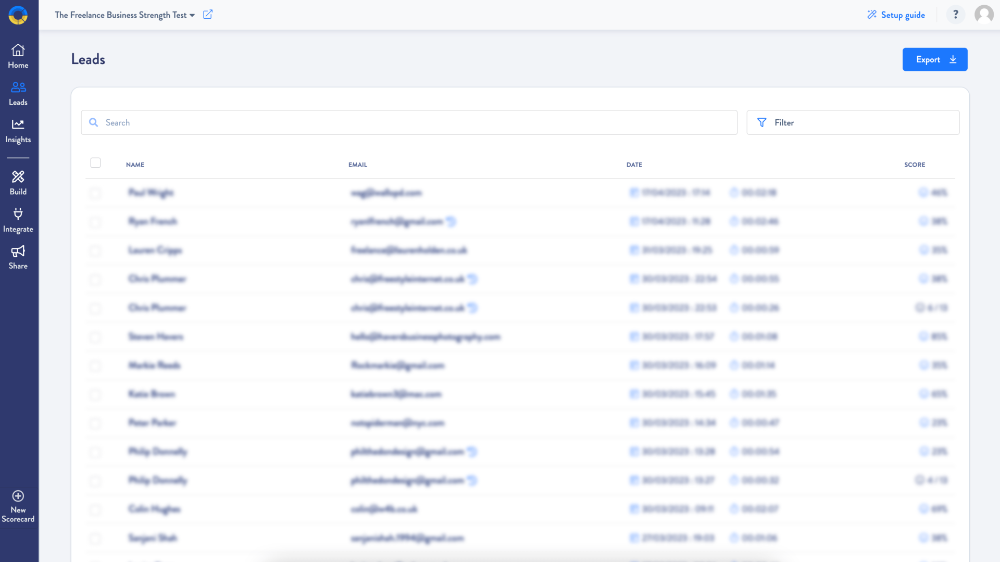
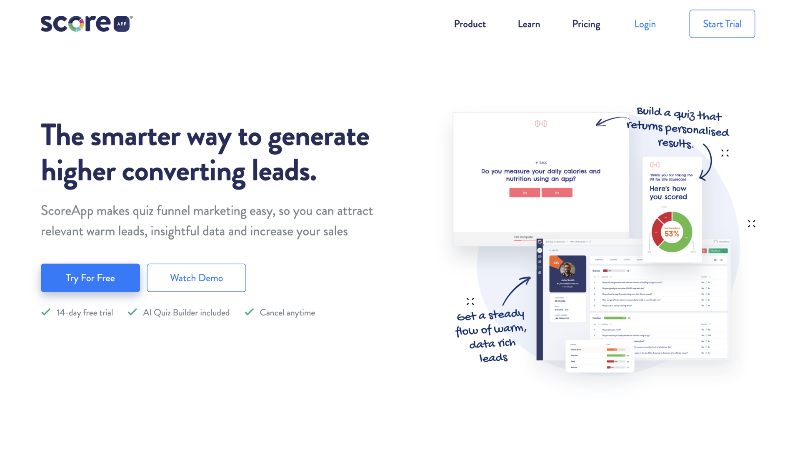
IMPORTANT: In this article I am using a lead generation quiz maker called ScoreApp.
Sign up here for an extended free trial
Sign up here for an extended free trial
Generate leads with a marketing scorecard quiz
- What is a scorecard marketing quiz?
- Marketing scorecard quiz examples
- Setting up a scorecard on ScoreApp
- How to promote your marketing quiz
What is a marketing scorecard quiz?
A scorecard is essentially a lead magnet. A potential client will hand over their name and email address to you in exchange for something of value in return. Once you have these details, you can build a relationship with the person and sooner or later, make them an irresistible offer.
This is an established long-term strategy for getting clients into your business. Where a scorecard differs, however, is that it tells you a LOT MORE about your prospects than a traditional lead magnet would.
Lead magnets tend to be simple PDFs such as checklists or short ebooks, so you generally obtain as little information as possible from the prospect in order to get it into their hands. But along with their name and email address, a scorecard can tell you:
If you're a coach, designer or writer, this information is invaluable because it will make your sales process much easier and less painful.
As the entrepreneur behind ScoreApp, Daniel Priestley says: "everything in business is downstream from leads". They are the lifeblood of your business because no leads means no clients which means no money. Sad face. But with qualified leads, you can really set yourself apart from the competition and create massive value for your clients.
Imagine that you're a freelance web developer and before a prospect even books a call, you learn:
This information would equip you for a far more effective sales call, wouldn't you agree? You'll feel like you already know them.
This is an established long-term strategy for getting clients into your business. Where a scorecard differs, however, is that it tells you a LOT MORE about your prospects than a traditional lead magnet would.
Lead magnets tend to be simple PDFs such as checklists or short ebooks, so you generally obtain as little information as possible from the prospect in order to get it into their hands. But along with their name and email address, a scorecard can tell you:
- What their specific business problems are
- How long the problem has been occurring
- What impact it is having on their growth
- What solutions they may have already tried
- How ready the prospect is to invest in your solution
If you're a coach, designer or writer, this information is invaluable because it will make your sales process much easier and less painful.
As the entrepreneur behind ScoreApp, Daniel Priestley says: "everything in business is downstream from leads". They are the lifeblood of your business because no leads means no clients which means no money. Sad face. But with qualified leads, you can really set yourself apart from the competition and create massive value for your clients.
Imagine that you're a freelance web developer and before a prospect even books a call, you learn:
- How much traffic their current website receives
- How much they spend on hosting/maintenance/ads
- What technical knowledge they have in their team
- What their business goals are
- How much they're willing to invest in a new website
This information would equip you for a far more effective sales call, wouldn't you agree? You'll feel like you already know them.

Now you might be questioning "how does a scorecard differ from a website enquiry form?"
You're probably thinking you can just ask these questions on your website when somebody books a call with you. You certainly can, but the point of a marketing quiz for lead generation is that it offers huge value to the prospect before they meet with you.
So what? Well think about this: business is built on trust
The point of marketing is basically to increase the trust that a prospect has in you. Therefore, the more value you can provide up-front before trying to sell, the more the prospect will trust you.
And the more they trust you, the more likely they will buy, and the higher the fee you can charge.
So, to summarise: a marketing scorecard is basically a smart, interactive lead magnet that drives value and builds trust.
As I said earlier, the quiz maker we're using in this article is ScoreApp. Use my referral link to get an extended 30 day trial absolutely free.
At time of writing ScoreApp's pricing plan starts at ~$40/month. But get this right, and it will pay for itself many, many times over. If you generated 10 leads a month and only converted one half-decent project, that would probably cover the cost of ScoreApp for a year.
So what? Well think about this: business is built on trust
The point of marketing is basically to increase the trust that a prospect has in you. Therefore, the more value you can provide up-front before trying to sell, the more the prospect will trust you.
And the more they trust you, the more likely they will buy, and the higher the fee you can charge.
So, to summarise: a marketing scorecard is basically a smart, interactive lead magnet that drives value and builds trust.
As I said earlier, the quiz maker we're using in this article is ScoreApp. Use my referral link to get an extended 30 day trial absolutely free.
At time of writing ScoreApp's pricing plan starts at ~$40/month. But get this right, and it will pay for itself many, many times over. If you generated 10 leads a month and only converted one half-decent project, that would probably cover the cost of ScoreApp for a year.
Marketing scorecard quiz examples
Using a quiz to generate leads is still a relatively new and underused strategy in digital marketing. But I have found it to be hands-down the most effective method to bring in qualified prospects. Here's the first scorecard I created using ScoreApp:
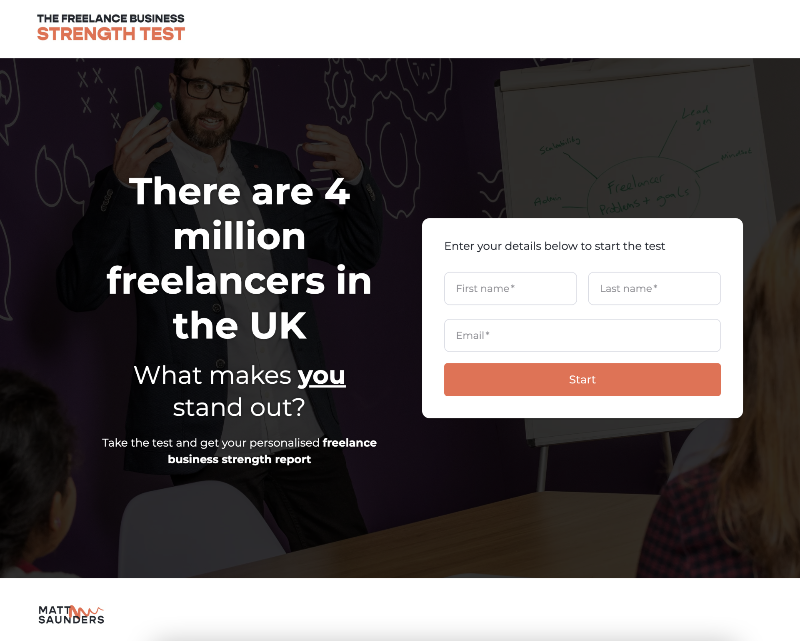
The Freelance Business Strength Test asks the question: there are 4 million freelancers in the UK, what makes you stand out?
Right away the goal is to create a little tension in the mind of the quiz taker. They are prompted to take the test to find out how strong and resilient their business is, and on the results page, they are given some quick tips to improve.
Right away the goal is to create a little tension in the mind of the quiz taker. They are prompted to take the test to find out how strong and resilient their business is, and on the results page, they are given some quick tips to improve.
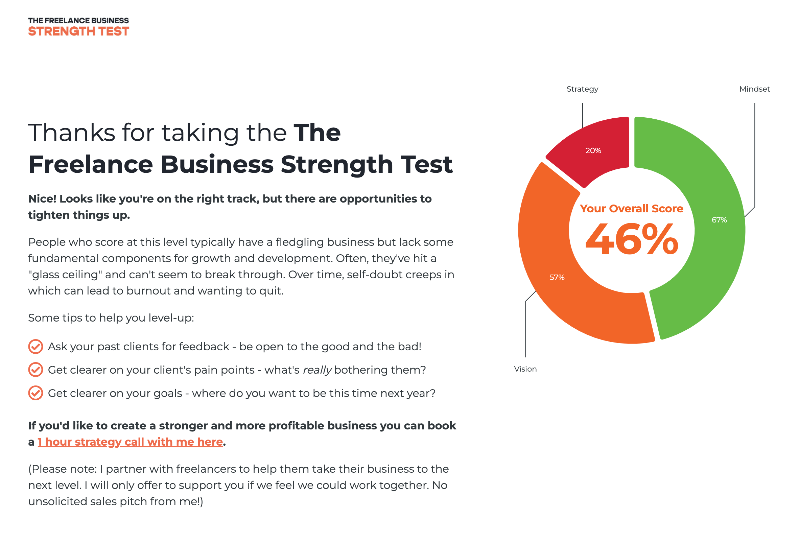
You'll also note that on this page, the prospect can book a call with me to discuss their results. This quiz has generated dozens of leads and still delivers new ones today - you can see it here.
Are you sensing the amazing potential for scorecard marketing yet? There are other tools that can collect prospect data in this way, but ScoreApp is the best quiz software for lead generation I've used because you can create robust and genuinely useful results pages like the one above.
Let's take a look at some more lead generation quiz examples:
Marketing quizzes are used by web designers, coaches, copywriters, accountants and entrepreneurs to generate leads in a more sophisticated way. A way that will prime your prospects to book a call with you and buy. If you're ready to build your own scorecard, I'm going to show you exactly how to do that in the next section.
Are you sensing the amazing potential for scorecard marketing yet? There are other tools that can collect prospect data in this way, but ScoreApp is the best quiz software for lead generation I've used because you can create robust and genuinely useful results pages like the one above.
Let's take a look at some more lead generation quiz examples:
- Is your business ready for YouTube?
- SaaS website optimisation quiz
- Take the Scale-up & Exit Business Assessment™
Marketing quizzes are used by web designers, coaches, copywriters, accountants and entrepreneurs to generate leads in a more sophisticated way. A way that will prime your prospects to book a call with you and buy. If you're ready to build your own scorecard, I'm going to show you exactly how to do that in the next section.
How to build a ScoreApp marketing quiz in 3 steps
If you've not yet done so register ScoreApp using my referral link to get an extended trial. For your peace of mind, know that I only promote products I genuinely love and utilise in my own business. If you pay to use ScoreApp, I'll get a commission. But follow this advice, and you'll get a lead generation engine that brings in prospects on autopilot 😎
Step 1: Establish the outcome
Before we actually create our marketing quiz, first we must answer the question of WHY.
The key thing to remember when creating a scorecard is that people should feel compelled to fill it out. They should want to complete it because of some perceived valuable outcome.
Just as I make a promise to help freelancers strengthen their business, in my scorecard you must make a similar statement to your quiz takers.
For example, imagine you're a copywriter. You love writing persuasive website copy because you know it helps your clients to sell their products. Your scorecard should offer some quick wins, based on where they're currently at, to help them move forward in their business even if they don't hire you. That's the mark of a good scorecard (and a clever businessperson).
So, start with the end in mind. What's in it for them? Why should someone take your quiz? Write down the outcome your prospect is going to get, then we can move onto the questions.
The key thing to remember when creating a scorecard is that people should feel compelled to fill it out. They should want to complete it because of some perceived valuable outcome.
Just as I make a promise to help freelancers strengthen their business, in my scorecard you must make a similar statement to your quiz takers.
For example, imagine you're a copywriter. You love writing persuasive website copy because you know it helps your clients to sell their products. Your scorecard should offer some quick wins, based on where they're currently at, to help them move forward in their business even if they don't hire you. That's the mark of a good scorecard (and a clever businessperson).
So, start with the end in mind. What's in it for them? Why should someone take your quiz? Write down the outcome your prospect is going to get, then we can move onto the questions.
Step 2: Write your questions
At its heart, ScoreApp is a quiz making app. Therefore you should focus your attention on asking your potential customers interesting questions. Quizzes are, after all, supposed to be fun!
But please bear this critical message in mind: your questions must generate a useful result for your prospect. This is not just a method for you to get leads; it's a way to create value for your potential client.
As a rule of thumb I suggest the 80/20 rule:
What do I mean by this? Let me give you an example. Let's imagine you're a copywriter and you want to find out how much a prospect tends to spend on copywriting services as a means to qualify them.
You could ask "how much do you spend on copywriting?" which is great for you, but offers very little value for them. To be more customer-focused, you might instead ask "how important is professionally written content to you?" and "how often do you outsource blog writing?"
These questions are more effective because:
Let's be honest: people know when they're being qualified. They know when you're only asking questions for your own benefit. Your task is to flip that mindset and focus on helping them as early as possible.
But please bear this critical message in mind: your questions must generate a useful result for your prospect. This is not just a method for you to get leads; it's a way to create value for your potential client.
As a rule of thumb I suggest the 80/20 rule:
- 80% of your questions should be asked to help the prospect
- 20% of your questions should be asked to help your sales process
What do I mean by this? Let me give you an example. Let's imagine you're a copywriter and you want to find out how much a prospect tends to spend on copywriting services as a means to qualify them.
You could ask "how much do you spend on copywriting?" which is great for you, but offers very little value for them. To be more customer-focused, you might instead ask "how important is professionally written content to you?" and "how often do you outsource blog writing?"
These questions are more effective because:
- They provide insights to you on how valuable the prospect may determine your service to be
- They get the prospect thinking about their own marketing investments and activities
- Using this data you can share tips to help them improve (on the results page and sales call)
Let's be honest: people know when they're being qualified. They know when you're only asking questions for your own benefit. Your task is to flip that mindset and focus on helping them as early as possible.
You-centric vs. customer-centric questioning
❌ How much do you spend on copywriting?
✅ How important is professionally written content to you?
The goal here is to build up a picture of your prospect by asking questions that will make them consider the way they run their own business. In the example above, if it appears that the prospect has invested very little in professional copywriting, you can make a pretty fair assumption that this is why they're failing to make sales through their website.
Gathering this knowledge is INSANELY powerful at the sales stage, and will help you make recommendations to move them forward.
Gathering this knowledge is INSANELY powerful at the sales stage, and will help you make recommendations to move them forward.
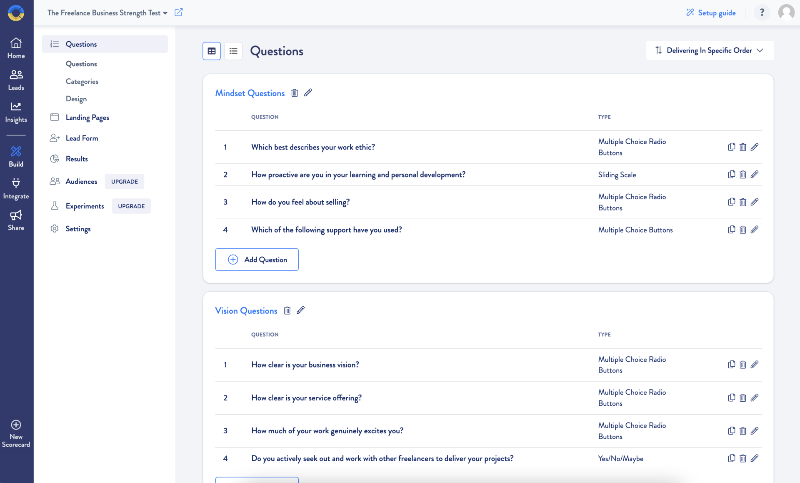
Before we move on it's worth talking about the question builder inside ScoreApp. Two things to consider:
Your marketing quiz can utilise various question formats such as sliding scales, binary answers and multiple choice options. You can also group questions into categories (my quiz uses the grouping "mindset", "vision" and "strategy", for example). If you have not used ScoreApp before, my advice is to not worry about getting this right straight away and to simply get your scorecard up and running. You can refine it later.
Think big, but start small 😏
- Question types
- Question categories
Your marketing quiz can utilise various question formats such as sliding scales, binary answers and multiple choice options. You can also group questions into categories (my quiz uses the grouping "mindset", "vision" and "strategy", for example). If you have not used ScoreApp before, my advice is to not worry about getting this right straight away and to simply get your scorecard up and running. You can refine it later.
Think big, but start small 😏
Step 3: Create your results page
Once you have defined your core outcome and written some questions, it's time to create a results page. Head over to Build > Results > Results Pages and click Create Result Page.
In the spirit of being customer-centric, remember that this is the page people see after they've taken your quiz. It needs to give value. Ideally, it will inspire them to take action - to book a call with you, watch one of your videos or follow you on social media.
In the spirit of being customer-centric, remember that this is the page people see after they've taken your quiz. It needs to give value. Ideally, it will inspire them to take action - to book a call with you, watch one of your videos or follow you on social media.
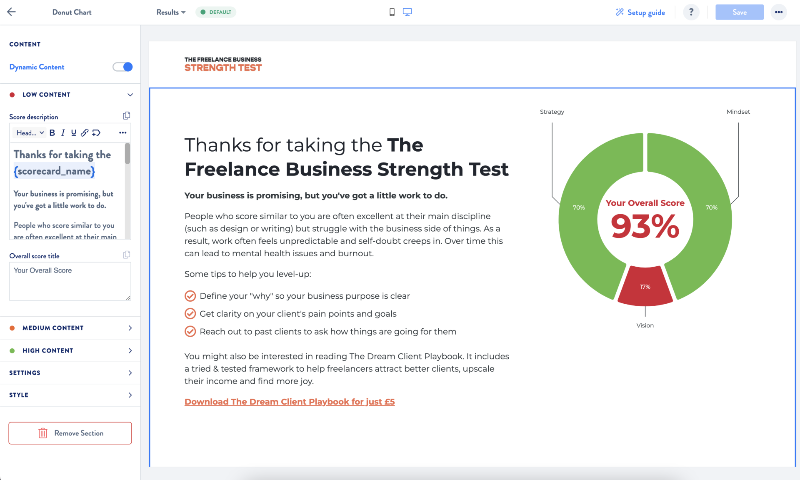
Here are some tips to create an effective ScoreApp results page that prompts action:
Give conditional answers
ScoreApp lets you customise the results page based on the score the quiz taker gets. This enables you to tailor the advice you give them. Connecting with people where they're at is a powerful and underused tool in marketing. This functionality enables you to get much more specific in how you direct them. For example, if they score low, you might ask them to watch a video or download your ebook. If they score highly, however, you might prompt them to book a call with you. Generally speaking, the low, medium and high score rating tallies with how warm-hot a prospect actually is.
Capture the essence of the result in one statement
The magic of using a scorecard is that you'll know how well your prospect is doing in their business. Isn't that amazing? If they score highly, tell them they're doing great. If not, be bold and let them know. This is the point of a scorecard. Give them a simple way to understand their result.
Keep your description short and sweet
It can be so tempting to write an essay on your results page. But resist the urge to start trying to offer comprehensive solutions and giving them a tonne of advice. Just acknowledge where they're at, empathise with them, and then give 3 tips.
Offer 3 actionable tips
Give conditional answers
ScoreApp lets you customise the results page based on the score the quiz taker gets. This enables you to tailor the advice you give them. Connecting with people where they're at is a powerful and underused tool in marketing. This functionality enables you to get much more specific in how you direct them. For example, if they score low, you might ask them to watch a video or download your ebook. If they score highly, however, you might prompt them to book a call with you. Generally speaking, the low, medium and high score rating tallies with how warm-hot a prospect actually is.
Capture the essence of the result in one statement
The magic of using a scorecard is that you'll know how well your prospect is doing in their business. Isn't that amazing? If they score highly, tell them they're doing great. If not, be bold and let them know. This is the point of a scorecard. Give them a simple way to understand their result.
Keep your description short and sweet
It can be so tempting to write an essay on your results page. But resist the urge to start trying to offer comprehensive solutions and giving them a tonne of advice. Just acknowledge where they're at, empathise with them, and then give 3 tips.
Offer 3 actionable tips
As above, don't go overboard here. Offer three sentences, as short as possible, that they can action to move their business forward. Perhaps it's a book recommendation or a simple exercise they can follow. Make it actionable and easy. Stay customer-centric.
Link your CTA to their result
Your call to action should appeal to their needs. This isn't a space to try to sell something they don't want or need. Continuing the idea that you sell copywriting services, perhaps your CTA could be to book a copy audit with you, or watch a video you made about writing an effective blog post. As always - think about how you can inch them forward without asking for a heavy investment at this early stage.
Follow these steps and you'll have a results page that prompts your prospect to take a positive next step. Try not to overthink this page, and don't clutter it up with unnecessary stuff. Keep it tight, focused and helpful. Then invite the prospect further into your world with a compelling and relevant call to action.
Next up, we're going to create your landing page, the entry point to your scorecard.
Link your CTA to their result
Your call to action should appeal to their needs. This isn't a space to try to sell something they don't want or need. Continuing the idea that you sell copywriting services, perhaps your CTA could be to book a copy audit with you, or watch a video you made about writing an effective blog post. As always - think about how you can inch them forward without asking for a heavy investment at this early stage.
Follow these steps and you'll have a results page that prompts your prospect to take a positive next step. Try not to overthink this page, and don't clutter it up with unnecessary stuff. Keep it tight, focused and helpful. Then invite the prospect further into your world with a compelling and relevant call to action.
Next up, we're going to create your landing page, the entry point to your scorecard.
Step 4: Create your landing page
The reason I've added this as a later step is because it's useful to create the "meat" of your quiz before designing the packaging. Once you've added your questions and created a results page, you'll have a much clearer idea of how to present the quiz to prospects.
Your landing page doesn't need to be fancy. It just needs to make a bold promise to a specific audience. Here are a few examples:
Can you see how the people in these sectors (SaaS, coaching and construction respectively) might be compelled to fill out these quizzes? Keep your landing page hyper-focused on getting your prospects to start the scorecard. Make big claims like:
The goal of your landing page is to quickly get them into your quiz. You can give more insights on your results page.
Your landing page doesn't need to be fancy. It just needs to make a bold promise to a specific audience. Here are a few examples:
- Your SaaS website not getting any traffic? Take our 3 minute quiz to find out why + get tips to improve (quiz created by a SaaS copywriter)
- How disorganised is your coaching business? Answer 10 questions to find out (quiz created by a virtual assistant)
- What impact is AI going to have on your construction company? Find out in 2 minutes (quiz created by an AI consultant)
Can you see how the people in these sectors (SaaS, coaching and construction respectively) might be compelled to fill out these quizzes? Keep your landing page hyper-focused on getting your prospects to start the scorecard. Make big claims like:
- Discover the 3 things that SaaS websites get wrong
- Discover the BEST app to help you land coaching clients
- Learn how AI is going to disrupt the construction in the next 12 months
The goal of your landing page is to quickly get them into your quiz. You can give more insights on your results page.
Step 5: How to promote your marketing scorecard
Once you have your quiz up and running it's time to start generating leads! To keep this section super-focused for you I'm going to share the two methods I use to get people to take my scorecard: LinkedIn posting and cold outreach.
Promoting your scorecard in a LinkedIn post
I'm dedicated to growing my audience on LinkedIn because it's the main platform for my core audience (solo business owners). I spend a lot of time there building up trust by posting useful content and having conversations in the comments. Therefore, when I share my scorecard, people take notice.
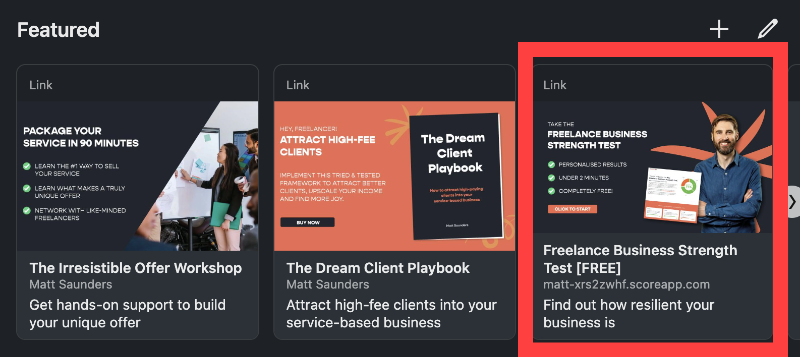
The above screen shot shows the scorecard linked in my profile Featured section. People click this when they view my profile.
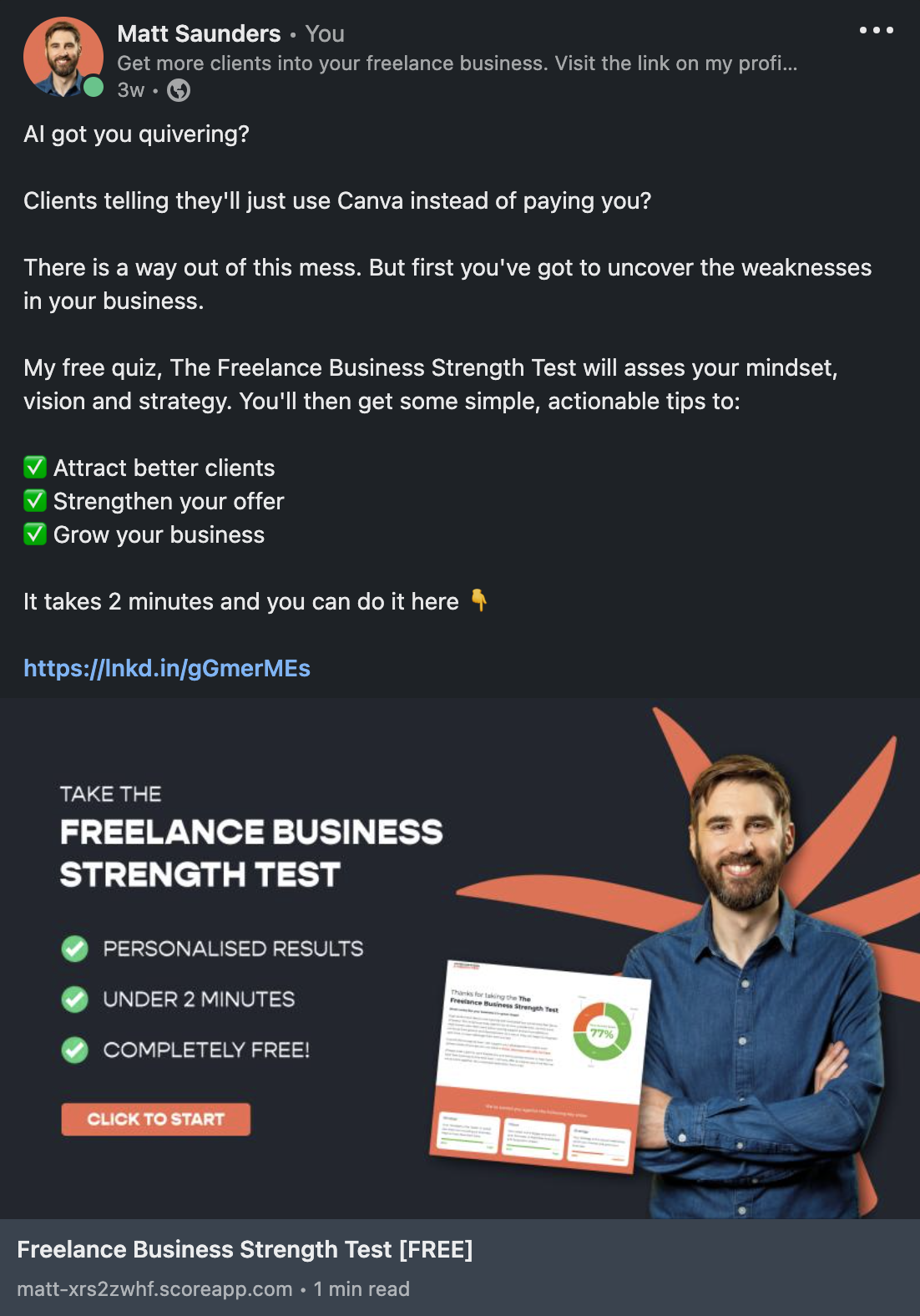
The above screen grab shows a LinkedIn post promoting my quiz. I tend to post my quizzes every couple of weeks. The posts themselves don't tend to get much engagement, but plenty of people click through to complete it. Attribution on this is really tough, so I can't give you specific numbers. All I can say is it works.
Inviting cold prospects to complete your scorecard
I send automated messages on LinkedIn when people connect with me. One of the messages I've trialled is a soft invite to take my quiz. This might sound spammy, but if you target the correct audience and don't ram it down their throat (treat it as an invitation instead) the response rate is pretty good (well, around 3-5% but when you're not doing it manually that's a great strike rate).
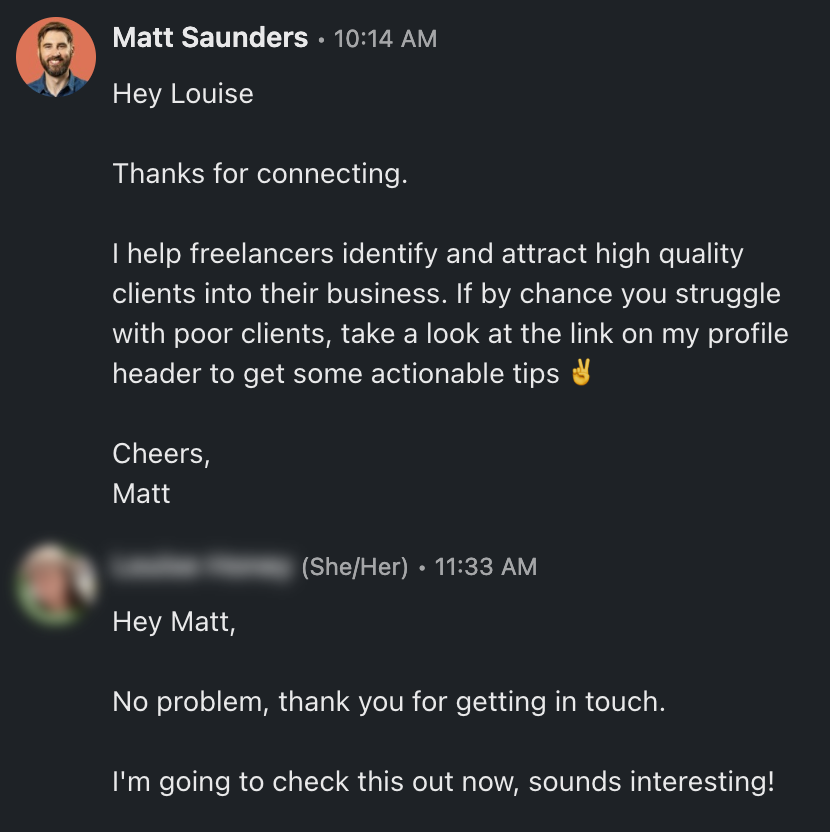
You don't need to automate this - you could manually reach out to people offering them your scorecard if it seems from their profile or posts that it would be valuable to them.
Pro tip: if somebody reaches out to you, don't rush to book them into a call. Ask them to complete your quiz first. This demonstrates that you follow processes and aren't desperate for work.
So, there you have it; my two methods for sharing your scorecard on LinkedIn. Remember: I generated 260 leads in under six months using this method alone. Just imagine what you could achieve if you started getting your scorecard in front of new people on a daily basis.
Pro tip: if somebody reaches out to you, don't rush to book them into a call. Ask them to complete your quiz first. This demonstrates that you follow processes and aren't desperate for work.
So, there you have it; my two methods for sharing your scorecard on LinkedIn. Remember: I generated 260 leads in under six months using this method alone. Just imagine what you could achieve if you started getting your scorecard in front of new people on a daily basis.
Frequently asked questions
Should I collect user details before or after the quiz?
In ScoreApp you can request that your quiz takers enter their name and email before or after the quiz. I recommend you have them do it first if your goal is lead generation. If you're more interested in gathering a wide data set and not following up with individuals, ask for details after quiz submission.
How many questions should there be in my lead magnet quiz?
Personally I aim for 10. It's a nice round number, it should collect enough data to provide value to both parties and it won't take the prospect long to complete the quiz. If you can do this with fewer questions, even better. The rule of thumb to how many questions there should be is: as few as possible to drive value and qualify the lead.
Does my marketing scorecard need a catchy name?
If the promise you make is big enough and the quiz taker trusts you, your quiz probably doesn't need a catchy name. But branding up a lead magnet as a standalone "thing" just adds that extra level of desirability and curiosity. So if you can come up with an interesting name for it, even better. But don't let not having one stop you from launching.
Summary - is a quiz a good lead magnet?
If you've tried creating lead magnets in the past but struggled to have people download them, a quiz might just be the answer. Marketing scorecards are still novel, and their power to establish your authority and trust is unmatched. People love to take them, so without a doubt, a quiz is potentially a GREAT lead magnet for your business.
In this article I have explained what a scorecard is, the benefits of running one and I've taken you through setting up a simple quiz with ScoreApp. If you've followed me so far and you've set up your own scorecard, I'd love to see it! You can reach me on LinkedIn. And if you'd like more insights and tips to grow your freelance business, be sure to signup to my weekly newsletter.
I hope to hear from you soon, but until that time, happy quizzing!
In this article I have explained what a scorecard is, the benefits of running one and I've taken you through setting up a simple quiz with ScoreApp. If you've followed me so far and you've set up your own scorecard, I'd love to see it! You can reach me on LinkedIn. And if you'd like more insights and tips to grow your freelance business, be sure to signup to my weekly newsletter.
I hope to hear from you soon, but until that time, happy quizzing!

Copyright © 2024
Company number 11599252 | VAT number 308863483
Company number 11599252 | VAT number 308863483
